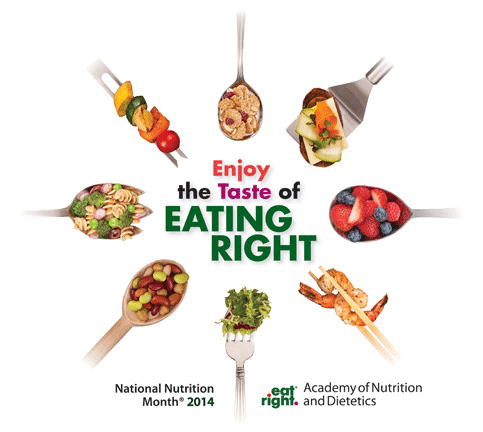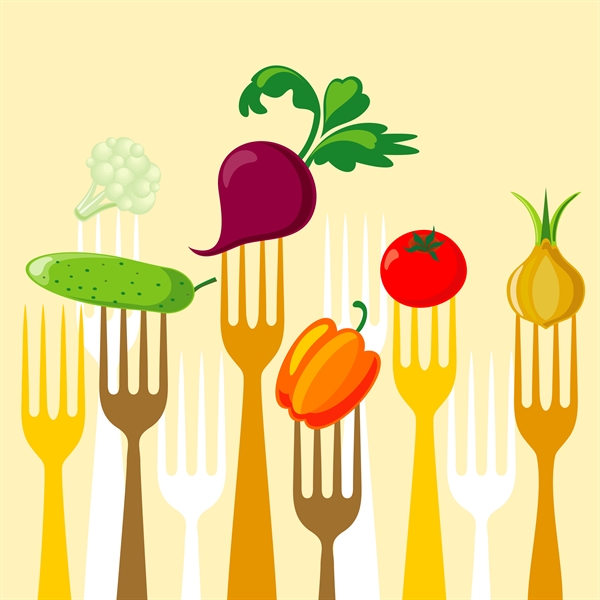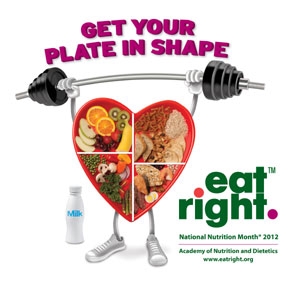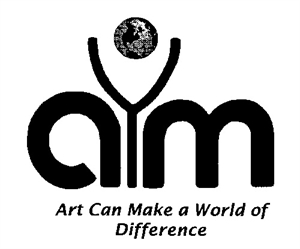National Nutrition Month on March, 2025: What are some good books on nutrition I should read?
March, 2025 is National Nutrition Month 2025.
As an Amazon Associate I earn from qualifying purchases.

National Nutrition Month is a nutrition education and information campaign sponsored annually by the American Dietetic Association (ADA). The March campaign, now in its fifth year, is designed to focus attention on making informed food choices and developing sound eating and exercise habits.
The health guidelines for National Nutrition Month help the public make better choices which could help reduce the risk for some chronic diseases, including cancer.
To accomplish this goal, the ADA recommends that people:
Aim for fitness - exercise at least 30 minutes a day, five or more days a week
Build a healthy base - follow national dietary guidelines
Choose foods sensibly
In regard to choosing healthy foods, people are encouraged to:
Drink skim milk
Eat five to seven servings of fruit and vegetables each day
Eat lean meats
Drink eight 8-ounce glasses of water a day
Choose foods made with little or no added fats or creams
Bake or broil foods instead of frying
Drink beverages and eat foods containing little or no sugar
Prepare foods with less salt (limit fast foods)
Limit fast foods
Drink in moderation if they drink alcohol
For more information about these and other dietary questions, the ADA encourages people to ask their physicians to refer them to a dietician who can assess their individual nutritional needs.

5 month old food....................................?
The following organizations recommend that all babies be exclusively breastfed (no cereal, juice or any other foods) for the first 6 months of life (not the first 4-6 months):
* World Health Organization
* UNICEF
* US Department of Health & Human Services
* American Academy of Pediatrics
* American Academy of Family Physicians
* American Dietetic Association
* Australian National Health and Medical Research Council
* Royal Australian College of General Practitioners
* Health Canada
Most babies will become developmentally and physiologically ready to eat solids by 6-9 months of age. For some babies, delaying solids longer than six months can be a good thing; for example, some doctors may recommend delaying solids for 12 months if there is a family history of allergies.
6 - 7 months Offer solids once a day, at most. Many start out offering solids every few days or even less often.
7 - 9 months Watch baby's cues - this is particularly easy if baby nurses beforehand and most/all of the solids are offered to baby to self-feed. Increase solids gradually if baby is interested, with a maximum of 2 meals per day.
9 - 12 months Watch baby's cues - this is particularly easy if baby nurses beforehand and most/all of the solids are offered to baby to self-feed. Increase solids gradually if baby is interested. Aim for baby getting no more than 25% of her calories from solids by the age of 12 months (some babies eat less than this at 12 months and that's also normal).
After six months, Mrs Rapley said babies were capable of taking food into their mouths and chewing it.
Therefore, feeding them pureed food at this time could delay the development of chewing skills.
Instead, she said, they should be given milk and solid pieces of food which they could chew.
Mrs Rapley argued that babies fed pureed food had little control over how much food they ate, thus rendering them vulnerable to constipation, and running a risk that they would react by becoming fussy eaters later in life.
She blamed the food industry for convincing parents that they should give children pureed food.
She said: "Sound scientific research and government advice now agree that there is no longer any window of a baby's development in which they need something more than milk and less than solids."
Take rice cereal, for example. Under conventional American wisdom, it's the best first food. But Butte says iron-rich meat — often one of the last foods American parents introduce — would be a better choice.
Dr. David Ludwig of Children's Hospital Boston, a specialist in pediatric nutrition, says some studies suggest rice and other highly processed grain cereals actually could be among the worst foods for infants.
"These foods are in a certain sense no different from adding sugar to formula. They digest very rapidly in the body into sugar, raising blood sugar and insulin levels" and could contribute to later health problems, including obesity, he says.
The lack of variety in the American approach also could be a problem. Exposing infants to more foods may help them adapt to different foods later, which Ludwig says may be key to getting older children to eat healthier.
Food allergy fears get some of the blame for the bland approach. For decades doctors have said the best way to prevent allergies is to limit infants to bland foods, avoiding seasonings, citrus, nuts and certain seafood.
But Butte's review found no evidence that children without family histories of food allergies benefit from this. Others suspect avoiding certain foods or eating bland diets actually could make allergies more likely. Some exposure might be a good thing.
...
Meat provides additional protein, zinc, B-vitamins, and other nutrients which may be in short supply when the decrease in breast milk occurs. A recent study from Sweden suggests that when infants are given substantial amounts of cereal, it may lead to low concentrations of zinc and reduced calcium absorption (Persson 1998). Dr. Nancy Krebs has shared preliminary results from a large infant growth study suggesting that breastfed infants who received pureed or strained meat as a primary weaning food beginning at four to five months, grow at a slightly faster rate. Dr. Krebs' premise is that inadequate protein or zinc from complementary foods may limit the growth of some breastfed infants during the weaning period. Both protein and zinc levels were consistently higher in the diets of the infants who received meat (Krebs 1998). Thus the custom of providing large amounts of cereal products and excluding meat products before seven months of age may not meet the nutritional needs of all breastfed i

My four month old and eating rice cereal?
Firstly you shouldn't start solids before six months because of the immediate risks of: malnutrition, anemia, choking, failure-to-thrive and the long term risks of: allergies, asthma, diabetes, obesity, auto-immune disorders, etc.
Secondly infant cereal is garbage, read the ingredients and google all the ones you don't understand and then tell me you want to feed that to an infant. I wouldn't feed a food with that many non-nutrative sweeteners, chemicals and oils to my dog. Breastfed babies don't need infant cereal and weaning diets high in grains have been shown to increase the incidence of anemia, zinc-deficiency and poor growth.
You should NEVER replace a breastmilk feeding with solids until the baby is a year old. Breastmilk first THEN other foods.
Should I offer solids before or after nursing?
What we're aiming for during the first year is to have solids complementing breastmilk, not replacing it. This means that when solids are introduced the breastfeeding pattern is not interrupted at all, but baby is fed solids in slowly increasing amounts as his appetite increases. Baby will be getting the same amount of breastmilk (or even more) as he gets older, with increasing amounts of solids on top of that.
I think the main point in the matter is maintaining breastmilk as baby's main source of nutrition throughout the first year. This is important both to baby's good nutrition and good health. The nutrients in breastmilk are particularly important for growth and development during baby's first year. In addition, some (but certainly not all) of the health benefits of breastfeeding are directly related to the degree of exclusivity of breastfeeding (the greater the percentage of baby's diet made up of breastmilk, the greater the health benefit).
Nursing before (rather than after) the solids is a good way to help keep the transition to solids proceeding slowly so that mom's milk supply is maintained and baby gets the breastmilk that he needs.
Why Delay Solids?
* Reasons for delaying solids
* Additional information
* References
Health experts and breastfeeding experts agree that it's best to wait until your baby is around six months old before offering solid foods. There has been a large amount of research on this in the recent past, and most health organizations have updated their recommendations to agree with current research. Unfortunately, many health care providers are not up to date in what they're telling parents, and many, many books are not up to date.
The following organizations recommend that all babies be exclusively breastfed (no cereal, juice or any other foods) for the first 6 months of life (not the first 4-6 months):
* World Health Organization
* UNICEF
* US Department of Health & Human Services
* American Academy of Pediatrics
* American Academy of Family Physicians
* American Dietetic Association
* Australian National Health and Medical Research Council
* Royal Australian College of General Practitioners
* Health Canada
Most babies will become developmentally and physiologically ready to eat solids by 6-9 months of age. For some babies, delaying solids longer than six months can be a good thing; for example, some doctors may recommend delaying solids for 12 months if there is a family history of allergies.
Reasons for delaying solids
Although some of the reasons listed here assume that your baby is breastfed or fed breastmilk only, experts recommend that solids be delayed for formula fed babies also.
* Delaying solids gives baby greater protection from illness.
Although babies continue to receive many immunities from breastmilk for as long as they nurse, the greatest immunity occurs while a baby is exclusively breastfed. Breastmilk contains 50+ known immune factors, and probably many more that are still unknown. One study has shown that babies who were exclusively breastfed for 4+ months had 40% fewer ear infections than breastfed babies whose diets were supplemented with other foods. The probability of respiratory illness occurring at any time during childhood is significantly reduced if the child is fed exclusively breast milk for at least 15 weeks and no solid foods are introduced during this time. (Wilson, 1998) Many other studies have also linked the degree of exclusivity of breastfeeding to enhanced health benefits (see Immune factors in human milk and Risks of Artificial Feeding).
* Delaying solids gives baby's digestive system time to mature.
If solids are started before a baby's system is ready to handle them, they are poorly digested and may cause unpleasant reactions (digestive upset, gas, constipation, etc.). Protein digestion is incomplete in infancy. Gastric acid and pepsin are secreted at birth and increase toward adult values over the following 3 to 4 months. The pancreatic enzyme amylase does not reach adequate levels for digestion of starches until around 6 months, and carbohydrate enzymes such as maltase, isomaltase, and sucrase do not reach adult levels until around 7 months. Young infants also have low levels of lipase and bile salts, so fat digestion does not reach adult levels until 6-9 months.
* Delaying solids decreases the risk of food allergies.
It is well documented that prolonged exclusive breastfeeding results in a lower incidence of food allergies (see Allergy References and Risks of Artificial Feeding). From birth until somewhere between four and six months of age, babies possess what is often referred to as an "open gut." This means that the spaces between the cells of the small intestines will readily allow intact macromolecules, including whole proteins and pathogens, to pass directly into the bloodstream.This is great for your breastfed baby as it allows beneficial antibodies in breastmilk to pass more directly into baby's bloodstream, but it also means that large proteins from other foods (which may predispose baby to allergies) and disease-causing pathogens can pass right through, too. During baby's first 4-6 months, while the gut is still "open," antibodies (sIgA) from breastmilk coat baby's digestive tract and provide passive immunity, reducing the likelihood of illness and allergic reactions before gut closure occurs. Baby starts producing these antibodies on his own at around 6 months, and gut closure should have occurred by this time also. See How Breast Milk Protects Newborns and The Case for the Virgin Gut for more on this subject.
* Delaying solids helps to protect baby from iron-deficiency anemia.
The introduction of iron supplements and iron-fortified foods, particularly during the first six months, reduces the efficiency of baby's iron absorption. Healthy, full-term infants who are breastfed exclusively for periods of 6-9 months have been shown to maintain normal hemoglobin values and normal iron stores. In one study (Pisacane, 1995), the researchers concluded that babies who were exclusively breastfed for 7 months (and were not give iron supplements or iron-fortified cereals) had significantly higher hemoglobin levels at one year than breastfed babies who received solid foods earlier than seven months. The researchers found no cases of anemia within the first year in babies breastfed exclusively for seven months and concluded that breastfeeding exclusively for seven months reduces the risk of anemia. See Is Iron-Supplementation Necessary? for more information.
* Delaying solids helps to protect baby from future obesity.
The early introduction of solids is associated with increased body fat and weight in childhood. (for example, see Wilson 1998, von Kries 1999, Kalies 2005)
* Delaying solids helps mom to maintain her milk supply.
Studies have shown that for a young baby solids replace milk in a baby's diet - they do not add to baby's total intake. The more solids that baby eats, the less milk he takes from mom, and less milk taken from mom means less milk production. Babies who eat lots of solids or who start solids early tend to wean prematurely.
* Delaying solids helps to space babies.
Breastfeeding is most effective in preventing pregnancy when your baby is exclusively breastfed and all of his nutritional and sucking needs are satisfied at the breast.
* Delaying solids makes starting solids easier.
Babies who start solids later can feed themselves and are not as likely to have allergic reactions to foods.
I encounter this situation frequently in my office. Many parents have the misconception that all infants will be ready for foods between 4 and 6 months of age. The truth is that very few infants are developmentally ready at 4 months. In addition, it is now recommended to delay foods until 6 months in order to decrease the chance of allergies. I also have found that some infants are not developmentally ready for solids until 8 or 9 months. You can click here to read about what signs to watch for to determine when your infant is ready for foods. Breast milk is nutritionally complete for at least the first year of life. This means that infants can go for at least a year on breast milk alone, without eating any foods, and be nutritionally complete. Offering foods between 6 and 12 months of age is simply for social development and to get infants used to eating.
I encourage parents not to try to coax their 6 month old into accepting solids before he shows many of the signs of being ready. This can create a picky eater and negative feelings about eating.
All mammals are protected by the same thing -they can't physically eat food until they are physiologically ready to digest it. For humans this means picking up the food, placing it in their mouth, gumming it, moving it back with their tongue, and swallowing it. The most obvious of course it the tongue thrust that newborns have -this reflex actively keeps food out of their body until they can digest it. But the other steps all have safeguards as well.
For healthy, full term infants the ability to eat food develops around 6-9 months. In recent years there have been numerous studies looking at the risks of certain things (allergies, asthma, anemia, etc) in relation to when solids are started and almost all have shown that the lowest risks are when solids are started between 6-9 months.
However it should also be noted that babies with allergies may refuse solids for up to a year, and that breastmilk is nutritionally complete for at least the first year of life despite earlier statements that it is not. An unpleasant feeling in the mouth is often a first sign of allergy and may cause babies to spit out rather than swallow allergenic foods. This is a very useful safeguard that should not be overridden.
You will know that he is really ready to start solids when:
* he is about six months old
* he can sit up without any support
* he continues to be hungry despite more frequent nursing which is unrelated to illness or teething
* he has lost the tongue-thrusting reflex and does not push solids out of his mouth
* he can pick up things with his finger and thumb (pincer grasp)
Babies who are ready for solids can usually feed themselves. Mothers often report that they knew their babies were ready when they picked up food from a plate, chewed it, swallowed it, and wanted more.
Most babies will become developmentally and physiologically ready to eat solids by 6-9 months of age. For some babies, delaying solids longer than six months can be a good thing; for example, some doctors may recommend delaying solids for 12 months if there is a family history of allergies.
The following organizations recommend that all babies be exclusively breastfed (no cereal, juice or any other foods) for the first 6 months of life (not the first 4-6 months):
* World Health Organization
* UNICEF
* US Department of Health & Human Services
* American Academy of Pediatrics
* American Academy of Family Physicians
* American Dietetic Association
* Australian National Health and Medical Research Council
* Royal Australian College of General Practitioners
* Health Canada
It appears that a baby's general development keeps pace with the development of his ability to manage food in his mouth, and to digest it. A baby who is struggling to get food into his mouth is probably not quite ready to eat it.
The babies who participated in the research were allowed to begin at four months. But they were not able to feed themselves before six months. Some of the younger babies picked food up and took it to their mouths; some even chewed it, but none swallowed it. Their own development decided for them when the time was right. Part of the reason for this study was to show (based on a theory of self-feeding) that babies are not ready for solid food before six months. It seems that we have spent all these years working out that six months is the right age and babies have known it all along!
It seems reasonable to predict that if parents choose to provide babies with the opportunity to pick up and eat solid food from birth they will still not be able to do it until around six months. The principle is the same as putting a newborn baby on the floor to play: he is being provided with the opportunity to walk but will not do so until about one year – because his own development stops him. But: everything depends on the baby being in control. Food must not be put into his mouth for him. Since it is very tempting to do this, it is probably safer to recommend that babies should not be given the opportunity to eat solid food before six months.
Many parents worry about babies choking. However, there is good reason to believe that babies are at less risk of choking if they are in control of what goes into their mouth than if they are spoon fed. This is because babies are not capable of intentionally moving food to the back of their throats until after they have learnt to chew. And they do not develop the ability to chew until after they have developed the ability to reach out and grab things. Thus, a very young baby cannot easily put himself at risk because he cannot get the food into his mouth in the first place. On the other hand, the action used to suck food off a spoon tends to take the food straight to the back of the mouth, causing the baby to gag. This means that spoon feeding has its own potential to lead to choking – and makes one wonder about the safety of giving lumpy foods off a spoon.
Why not cereal?
Cereal is not at all necessary, particularly the baby cereals. Regular (whole grain) oatmeal is more nutritious for your baby.
The truth is, there is nothing special about these foods that makes them better to start out with. Babies don't actually even need rice cereal
Meat provides additional protein, zinc, B-vitamins, and other nutrients which may be in short supply when the decrease in breast milk occurs. A recent study from Sweden suggests that when infants are given substantial amounts of cereal, it may lead to low concentrations of zinc and reduced calcium absorption (Persson 1998). Dr. Nancy Krebs has shared preliminary results from a large infant growth study suggesting that breastfed infants who received pureed or strained meat as a primary weaning food beginning at four to five months, grow at a slightly faster rate. Dr. Krebs' premise is that inadequate protein or zinc from complementary foods may limit the growth of some breastfed infants during the weaning period. Both protein and zinc levels were consistently higher in the diets of the infants who received meat (Krebs 1998). Thus the custom of providing large amounts of cereal products and excluding meat products before seven months of age may not meet the nutritional needs of all breastfed infants.
Meat has also been recommended as an excellent source of iron in infancy. Heme iron (the form of iron found in meat) is better absorbed than iron from plant sources. In addition, the protein in meat helps the baby more easily absorb the iron from other foods. Two recent studies (Makrides 1998; Engelmann 1998) have examined iron status in breastfed infants who received meat earlier in the weaning period. These studies indicate that while there is not a measurable change in breastfed babies' iron stores when they receive an increased amount of meat (or iron), the levels of hemoglobin circulating in the blood stream do increase when babies receive meat as one of their first foods.
Finally, respect the tiny, still-developing digestive system of your infant. Babies have limited enzyme production, which is necessary for the digestion of foods. In fact, it takes up to 28 months, just around the time when molar teeth are fully developed, for the big-gun carbohydrate enzymes (namely amylase) to fully kick into gear. Foods like cereals, grains and breads are very challenging for little ones to digest. Thus, these foods should be some of the last to be introduced. (One carbohydrate enzyme a baby's small intestine does produce is lactase, for the digestion of lactose in milk.1)
[...]
Babies do produce functional enzymes (pepsin and proteolytic enzymes) and digestive juices (hydrochloric acid in the stomach) that work on proteins and fats.12 This makes perfect sense since the milk from a healthy mother has 50-60 percent of its energy as fat, which is critical for growth, energy and development.13 In addition, the cholesterol in human milk supplies an infant with close to six times the amount most adults consume from food.13 In some cultures, a new mother is encouraged to eat six to ten eggs a day and almost ten ounces of chicken and pork for at least a month after birth. This fat-rich diet ensures her breast milk will contain adequate healthy fats.14
Thus, a baby's earliest solid foods should be mostly animal foods since his digestive system, although immature, is better equipped to supply enzymes for digestion of fats and proteins rather than carbohydrates.1 This explains why current research is pointing to meat (including nutrient-dense organ meat) as being a nourishing early weaning food.
The results indicate that in a group of healthy, well growing 12-month-old Swedish infants one-quarter is iron-depleted, although iron deficiency anaemia is rare, and one-third may be zinc-depleted. The high cereal intake of Swedish infants from 6 months of age may have limited the bioavailability of both iron and zinc from the diet.
Conclusions: These results confirm that meat as a complementary food for breast-fed infants can provide a rich source of dietary zinc that is well absorbed. The significant positive correlation between zinc intake and exchangeable zinc pool size suggests that increasing zinc intake positively affects metabolically available zinc.



















